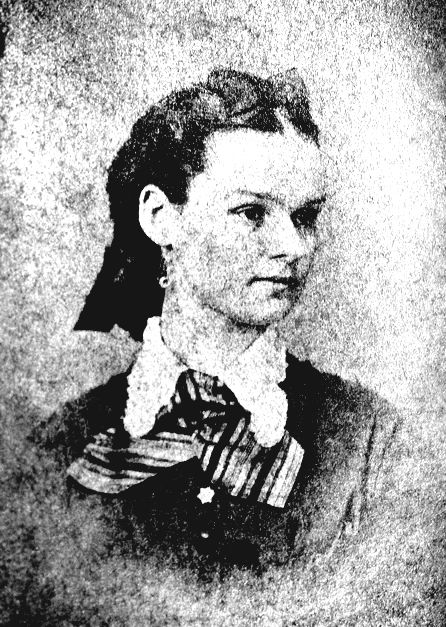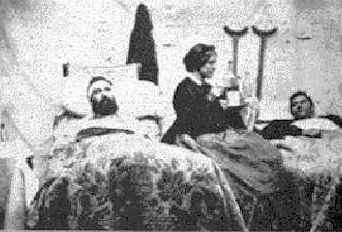150 years ago, the young America was on the tail end of decades of political strife that would result in the utter turmoil of a Civil War. In honor of this Sesquicentennial (the term for a 150 year anniversary for those who would have to look it up like I did), we’ll post articles throughout the year pertaining to the Civil War.
This first article is something of a difficult read. It’s the account of Lydia Catherine Ziegler, who was 13-years-old at the time of the Battle and living at the Schmucker Hall building we recently performed restoration work on – then known as the Lutheran Theological Seminary.
Lydia Catherine (Ziegler) Clare

Lydia Catherine Ziegler (May 5, 1850 – April 11, 1915) was born in Gettysburg, PA, and died in Abbottstown, PA. She married Rev. Richard H. Clare on July 4, 1872. She was the daughter of Emanuel Ziegler (1824-1893), the steward of the edifice of the Lutheran Theological Seminary in 1863.
A GETTYSBURG GIRL’S STORY OF THE GREAT BATTLE
(Written about the year 1900)
My children have long been urging me to give them in a short story my experience in the Battle of Gettysburg. I was then a girl of thirteen, living on the Seminary Ridge which today is known to every child who studies the history of the Civil War.
I shall never forget the June afternoon when I stood on the Seminary steps with my parents and other persons to see a Confederate host marching in the Chambersburg Pike. It seemed as if Pandemonium had broken loose. A more ragged and unkempt set of men would be hard to find. Many wore parts of Union soldiers’ suits which, I suppose, had been picked up on the field of battle, or had been discarded by our men. A squad from the main body was sent over to the Seminary to find out whether any Yankee soldiers were concealed there. After the investigators were informed that the building was a theological school edifice, a guard, was placed around it, and we felt perfectly safe. I do not think any property was destroyed at that time, excepting a few cars containing government supplies, which were burned and also the railroad bridge, a short distance from the town. Early the following morning our unwelcome guests took their departure for the purpose, they said, of capturing Baltimore and Washington. Shortly after the enemy left our place, we were made glad by seeing regiment after regiment of our own men come and encamp around us. We gave them a royal welcome.

The spring and summer of ’63 were days in which the citizens of our quiet village were much disturbed, for scarcely two consecutive weeks would pass without rumors reaching us that the enemy has crossed the Potomac and were headed in our direction. Anxiety filled every breast. Farmers would flee with their horses to a place of safety and merchants would either ship their valuable goods away or securely hide them. So day followed day, each seeming to bring fresh trouble. The enemy were close at hand.
How well do I remember the happiness it gave me to hand out the cakes and pies that our kind mother made until late at night for those boys in blue who seemed almost famished for a taste of “home victuals” as they called them. And, vividly too, do I remember that night of the 30th of June when I stood in the Seminary cupola and saw, as in panoramic view, the camp fires of the enemy all along the Blue Mountainside, only eight miles distant, while below us we beheld our little town entirely surrounded by thousands of camp fires of the Union Army. As we stood on that height and watched the soldiers on the eve of battle, our hearts were made heavy. Many of the soldiers were engaged in letter writing, perhaps writing the last loving missives their hands would ever pen to dear ones at home. In the near distance we could see a large circle of men engage in prayer, and as the breezes came our way, we could hear the petitions which ascended to the Father in heaven for his protecting care on the morrow. However, many of the boys seemed to be utterly oblivious to the dangers threatening them, and were singing with hearty good will “The Star Spangled Banner” and many of the other patriotic songs which we loved to hear.

July the 1st dawned brightly. The sun shone in all its splendor over the wheat fields which were of a golden hue and ready for the harvest. All nature seems to be offering praise to God for His manifold blessings. The members of our household were all up bright and early, for much was to be done for the comfort of the soldiers. But a spirit of unrest seemed to prevail everywhere. About eight o’clock an ominous sound was heard – a sound that struck terror to the hearts of all who heard it – it was the call to battle. All was excitement; company after company, regiment after regiment, fell into line, and, accompanied by music, the march began towards the front. As we stood in the doorway watching General Reynolds and his force approach, I asked father how the soldiers would cross the high fence surrounding our garden. I did not have long to wait until my curiosity was satisfied, for the General came at rapid pace, urging his men to follow, and the fence fell as if it were made of paper as the men pressed against it with crowbars and picks.
That and a call from a signal officer on the cupola sent me speeding to the house. There I found that all the family had repaired to the cellar for safety and well they did, for in a very short time two shells struck the building. After General Reynolds was killed and our army was being driven back towards the town which is a half-mile distant, father decided that we had better stay in line with our own soldiers, so we left the building and took up our march. My mother and the older members of the family hurriedly snatched up a couple of loaves of bread as we left the house, and It was well they did, for we had ample need of it before the day ended. I always had a desire to see something of a battle, so here was my opportunity. I quietly slipped from the house to the edge of the woods back of the Seminary, and was enjoying the awe-inspiring scene, when a bullet flew so near my head that I could hear the whizzing sound it made.
Our march into town was heart-sickening. Soldiers had fallen on all sides, and were wounded in every imaginable way. It seems that I can almost hear at this late day the groans and cries of the suffering men as they lay at our foot. War is, indeed. a terrible thing! We did not remain in the town very long for we felt that the woods would be safer. The first place we got to was Culp’s Hill, but our stay there was of short duration, for the shells and bullets drove us out. Next we went to Spangler’s Spring with no better result. Then we stopped on Wolf’s Hill. A heavy rain had come on, lasting about an hour; we were drenched to the skin, and Oh! so very tired and hungry. Mother divided the bread among us, and we children gathered wild raspberries to eat with it; and. even now, although we are all men and women, I think each one will say that that was the most palatable meal we ever ate.
We, however, found that we had not yet reached our haven of rest, for even here the shells and bullets began to fall, so our wandering began again. Our poor, faithful old dog Sport could no longer walk, so we children took turns in carrying him, and the poor old fellow would lick our hands to show his gratitude.
About four o’clock in the afternoon we found our way out to the Baltimore Pike, near Two Taverns. There we met General Slocum’s Corps advancing towards Gettysburg on double quick. The poor soldiers looked so jaded and tired. Many of them had been compelled to fall out of line and we came upon them lying by the roadside, sick and hungry. The poor fellows had been marching all day without anything to eat. Such, however, is soldier’s life.
The shades of night had fallen ere we reached the home of a friend who kindly gave us shelter during the time of battle, another friend took us as far as Round Top in a wagon on our homeward journey. From that place the distance to the town is about three miles, and we decided to walk, for the ground was thickly strewn with unexploded shells which were likely to burst if struck. As we were starting for home, this dear friend gave us a bag containing six large loaves of bread, saying that we might find use for it, when we reached home.

We did not have to carry this bread very far after we left the wagon, for we found lying on the field lots of wounded men who had not had a bite to eat for three days, and they would beg us “for God’s sake” to give them some of the bread and some water to drink. I can picture to my mind even to this day my father and mother as they stood by these wounded men, father with his pocket knife cutting off pieces of the bread which my mother would have to put into the mouths of some who were too weak even to lift the bread to their lips, or take the water which we children carried from the little streams or springs nearby in cups made by fastening leaves together. Pen cannot describe the awful sights which met our gaze on that day.
I wish to make a correction to my statement that all was lost. We owned two beautiful white cows which still were alive when we returned to our home. These cows had been in the thickest of the fight for three days, yet were not hurt in any way. I suppose it is not necessary for me to tell you that they did not suffer from want of being milked during that time – the soldiers saw to it that that task was performed. We found the feet of out four fat hogs lying in the pen. The dying and the dead were all around us – men and beasts. We could count as high as twenty dead horses lying side by side. Imagine, if you can, the stench of one dead animal lying in the hot July sun for days. Here they were by the hundreds. All day long we ministered to the wants of the suffering, and it was night when we reached home, or what had been home, only to find the house filled with wounded soldiers. Oh, what a home-coming! Everything we owned was gone – not a bed to lie on, and not a change of clothing. Many things had been destroyed, and the rest had been converted to hospital purposes. And I am sorry to say right here that, while our government has plenty of money to dispose of, we who suffered such great loss at Gettysburg have never received one cent. Is there justice in this treatment? I would like to ask those in authority.
I do not wish to dwell on this subject too long, so will say that we tried to forget self and our losses in our care of the suffering who needed our help. It was a ghastly sight to see some of the men lying in pools of blood on the bare floor where they had been placed on the first and second days of the fight, many of them having received no care what ever. Nurses and doctors were in demand everywhere, so were hospital supplies. Transportation had been cut by the destruction of railroads and the burning of bridges. Many a poor fellow died within the first ten days after the battle for want of care and nourishing food. After the trains could run again, supplies came, and everything was carried on in a systematic manner.

But we could not think of sleep or rest during those trying days. Nights and days were alike spent in trying to alleviate the suffering of the wounded and dying. How often did I receive the dying message of a father or husband to send his loved ones whom he would never meet again on earth! I shall ever hold in sweet memory the repeatedly uttered “God bless you, my girl!” from the poor fellows after some little act of kindness had been shown them. So many pathetic scenes took place during those days. I remember going into the yard, late in the afternoon, about a week after the battle, and finding there an old man supporting the head of a sweet faced old lady on his shoulder. I walked up to this couple and asked if I could be of any assistance, for I saw the old lady looked faint and weary.
After listening to the pitiful story told us of losing four sons in the war, and knowing their last son had been in the battle of Gettysburg, and walking all of the twenty-one miles over the mountains from Chambersburg, since there was no other mode of travel for them, and carrying all this distance a satchel filled with dainties such as Charlie was fond of, we attempted to help them. And their son Charlie was found lying in one of the rooms of the third floor of the Seminary building in a dying condition. The cries of that mother as she bent over the body of her boy were heartbreaking. For a short time consciousness returned to Charlie, and he knew his parents, who shortly after had at least some measure of comfort in taking his dead body home for burial. The answer came from the trembling lips of the old gentleman: “Mother’s most tuckered out, but if we can find our boy Charlie, I guess she will be all right.”
I should like to tell you more about my varied experiences during the three months our home was used as a hospital, but my story has already become too lengthy.
NOTE
At the time of the great Battle of Gettysburg, Emanuel Ziegler, the father of Lydia Catherine, was steward of the Lutheran Theological Seminary, Seminary Ridge, where he and his wife and their six children had quarters on the first floor. Lydia Catherine, the youngest of the family, had four brothers – Jacob, John, William and Hugh, and one sister Anna.
On July 4th 1872, she was married in the Seminary Chapel to the Rev. Richard H. Clare, who had in the Spring of that year graduated from that institution, and who later, with her loving and ever-faithful co-operation, served parishes in Blain, PA, Bridgeton, New Jersey, Chambersburg, Pa., Hamilton Scotia, Pa., and Abbottstown, Pa. Pastor Clare died on February the 14th, 1908, and Lydia Catherine on April the 11th, 1915. They were survived by five children – the Rev. Henry E. Clare, Miss Mary R. Clare, the Rev. Robert D. Clare, the Rev. Martin L. Clare and Dr. Milo R. Clare, D.D., Stonehurst Court, C-220, Upper Darby, Pa.
